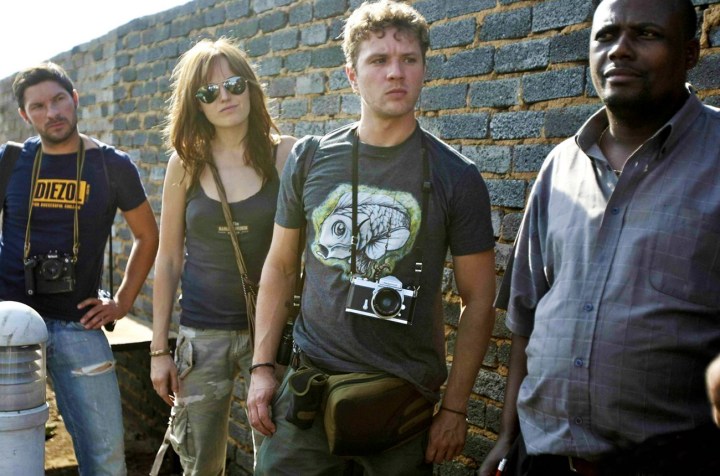Media, Multimedia
63rd Cannes: The Bang Bang Club, the movie – where art doesn’t imitate life

The Bang Bang Club debuted at the Cannes Film Market last week. The overseas response so far has been positive, although if you were a journo in Joburg in the ’90s you’ll be forgiven for wondering if your memory’s playing tricks on you.
This time last year the cast members of The Bang Bang Club jetted into Cannes, after having just having wrapped up shooting the movie in South Africa. “This is a far cry from Soweto,” Ryan Phillippe, who plays Greg Marinovich, had commented. Indeed it was, but, it seemed, a necessary part of “Hollywoodising” the story about the pack of four photographers who rose to fame during the last few years of apartheid. Get to Cannes, get the press buzzing, and get the world awaiting its release.
Well, those world release dates for the movie, a co-production between South Africa and Canada, are still being worked out and finalised. That’s the main reason for the film being here and making its debut at the Cannes Film Market earlier this week. The screenings were low-key, meant for interested buyers and press members. Of course, as a South African journalist, (one that has a small cameo in the film, nogal) I was very interested to see what they had done with the story, and how it would come out on celluloid. I was also interested in what the first few people to see the movie thought.
Watch: Bang Bang Club teaser
As we know, the story is about the four photographers: Marinovich, played by Phillippe; Kevin Carter, played by Taylor Kitsch; Ken Oosterbroek, played by Frank Rautenbach; and João Silva, played by Neels van Jaarsveld. In this Hollywood version of the story, Phillippe as Marinovich becomes the central character, and a love story is created between Malin Åkerman’s character, picture editor Robin, and Marinovich. Just how much of a problem some of these changes are going to be for those who were there at the time will soon become apparent.
Photojournalist Shayne Robinson has already expressed his concern to me about the film, saying the story had been changed. But Phillippe’s accent is spot on and while Kitsch may not get it quite as right, he does a good job of conveying some of the anguish Carter went through.
The film is fast-paced, has great music and reflects a certain time – and a certain view of apartheid – and zooms in on some of the people of the era. Veteran photographer Alf Khumalo has a few lines in the film and the beautiful montage of pictures taken by the Bang Bang Club photographers are a moving tribute. Phillippe is strong as Marinovich and his accent doesn’t falter.
These elements all work in the film’s favour. But there are also many elements that make it a Hollywood film – full of sex, drugs, and rock ’n’ roll. That is perhaps the question that will be asked when the film reaches South Africa. How much creative licence does a filmmaker have with a movie based on real-life events? This film is not a documentary, but it is based on a true story.
The Death of Kevin Carter: Casualty of the Bang Bang Club was a documentary about the subject of Carter’s suicide. It went on to be nominated for an Oscar for Documentary Short Subject in 2006. Documentaries have stricter guidelines than feature films. But with a feature, there are certain elements that are added to help the story along. In this case, one of them may have been the addition of a love interest for Marinovich in the form of Malin Åkerman’s character.
Marinovich and Silva were consultants on the film, but even that process can only go so far. The issue is relevant when it comes to other movies too, which is perhaps one of the reasons why Winnie Madikizela-Mandela has not given her support to Darrell Roodt’s upcoming film about her life. Even if you are consulted on the movie, it doesn’t necessarily mean your thoughts and suggestions will be followed. However, Roodt and producer André Pieterse have both emphasised that they don’t want to jeopardise the integrity of the movie.
At the end of the day, people make film for an audience. The people I spoke to outside the cinema theatre were all quite positive in their responses. They don’t care if Marinovich did not, in fact, have a love relationship with The Star’s picture editor. One American film-goer said he was quite surprised to find it was a South African story. “I never even knew that going into the film, but now I feel like I know a little bit more about what went down during that time.” A British film enthusiast said he liked Phillippe’s character, saying that he thought it was quite strong. A couple from Hong Kong said they enjoyed the story, because it was ‘gripping’ and ‘amazing’.
It seems there’s a need to strike a balance between Hollywood and reality. The director Steven Silver comes from a documentary background, so you can be sure this was a well-thought out and researched film. But it’s a film that seems to recognise that one or two things might need to be changed for the story of gung-ho courage to reach a larger audience.
By Nadia Neophytou
(Neophytou is an EWN reporter)
Read more: The Bang Bang Club on IMDb


















 Become an Insider
Become an Insider